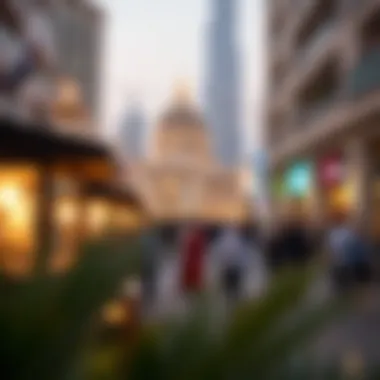Understanding UAE Public Holidays: Cultural and Economic Insights


Intro
Public holidays in the United Arab Emirates hold a special place in the cultural fabric and economic landscape of the nation. They serve as moments of reflection, festivity, and community bonding, each rooted in the rich historical and religious context of the region. As the UAE continues to evolve and expand, these holidays play a significant role in shaping the social and economic dynamics, particularly within the real estate sector.
This piece will break down how these occasions not only celebrate the heritage of the UAE but also create fluctuations in market performance, enticing both investors and potential homeowners alike. Through thorough analysis, we hope to enlighten individuals engaged in the UAE real estate landscape about the unique implications of public holidays on market activity.
Whether it’s the exhilarating atmosphere of Eid celebrations or the official observance of National Day, each holiday carries its own weight and importance. Understanding their significance is crucial for anyone looking to navigate the complexities of real estate during these peak periods.
Over the next sections, we will delve deeper into market trends and the effects of public holidays on buying and renting decisions, providing insights crucial for both seasoned investors and newcomers to the UAE real estate arena.
Understanding Public Holidays in the UAE
Public holidays in the United Arab Emirates serve more than just a break from routine; they are a focal point for cultural expression and national identity. These holidays reflect the country’s rich tradition and evolving economic landscape, shaping the way residents and visitors interact with one another and the environment around them. Understanding public holidays is paramount for anyone engaged in the UAE’s real estate market, as these days often translate into unique opportunities for both buyers and investors.
Definition and Nature of Public Holidays
Public holidays in the UAE are officially designated days when the majority of the workforce in both the public and private sectors enjoys time off. The dates of these holidays can fluctuate, particularly those tied to the Islamic lunar calendar, such as Eid al-Fitr or Eid al-Adha. Some holidays, including National Day and Flag Day, are fixed and celebrated annually on the same date.
The most significant aspect of these holidays is not just their observance but the underlying meanings and ceremonies attached to them. They often include pressing gatherings with family and friends, charitable activities, and moments for community reflection.
- Eid al-Fitr: Marks the end of Ramadan, the month of fasting and is celebrated with prayers and feasts.
- Eid al-Adha: Commemorates the willingness of Ibrahim to sacrifice his son, celebrated with community prayers and the sharing of meals.
- National Day: Celebrates the union of the seven emirates, often marked by events that foster a strong sense of patriotism.
Understanding the precise nature of these holidays enables stakeholders to navigate the market shifts they provoke.
Role in UAE's Cultural Identity
Public holidays play a pivotal role in bolstering the UAE's cultural identity. They function as a reminder of the traditions that have shaped the nation. Often, these holidays also promote communal values, emphasizing family ties and social responsibility. Celebrations during these periods showcase the splendid diversity within the UAE, particularly as expatriates join local citizens in observance. This unity can be particularly enriching during events like National Day, where cultural exhibitions and performances highlight various heritages and traditions.
Such observances impinge not only upon social dynamics but also on various sectors, particularly real estate. As families come together, the demand for community-oriented spaces increases—be it for gatherings or long-term living arrangements. Mortgage brokers, real estate agents, and developers can leverage these festive periods to appeal to potential buyers by offering promotions that align with the spirit of giving prevalent during these holidays.
"Public holidays not only enrich the cultural fabric of the UAE but also present critical insights into market trends and consumer behavior."
Moreover, these holidays often foster a sense of national pride. The visibility of UAE's history and cultural achievements during celebrations fosters goodwill among residents and multiple tourism opportunities for visitors. Hence, understanding their significance can provide valuable insights for investors looking to capitalize on housing demands or commercial propositions that may arise in the wake of these celebratory periods.
In summary, public holidays in the UAE go beyond mere observance; they are integral to the social, cultural, and economic life of the country. Investors and real estate professionals who grasp this unique landscape of observance will find themselves better equipped to predict and adapt to the fluctuations of market behaviors that coincide with these important occasions.
Historical Context of Public Holidays
Understanding the historical context of public holidays in the UAE is vital for grasping their significance in contemporary society. These holidays are not just marked dates on a calendar; they represent deeper cultural values and collective memories. They have evolved through various influences, shaping the national identity and social fabric of the UAE. The intersection of tradition and modernity during these observances provides a lens through which we can examine the country’s development and its diverse population’s unity.
Origins and Evolution of Holidays
Public holidays in the UAE trace their roots back to both Islamic traditions and national milestones. The earliest holidays sprang from religious observances such as Eid al-Fitr and Eid al-Adha, which have origins in Islamic history. These holidays have been celebrated for centuries, signifying the importance of community, faith, and gratitude. For instance, Eid al-Fitr, marking the end of Ramadan, is steeped in traditions of giving and feasting. It not only reflects personal piety but also highlights communal bonds.
Over the years, the landscape of public holidays expanded. The creation of the UAE in 1971 marked a significant turning point, as the government began establishing national days to celebrate unity and national identity. National Day, celebrated on December 2nd, serves not just as a remembrance of the federation but also as a backdrop for showcasing the UAE’s rapid development. This evolution speaks volumes about how holidays serve not only as observances but as catalysts for national pride and cohesion.
Influences from Regional Traditions
Regional traditions play a crucial role in shaping the observance of holidays in the UAE. The country’s history as a melting pot has led to a blend of customs and practices from neighboring regions. For example, the influence of the broader Arabian Peninsula is evident in how public holidays are celebrated, merging diverse cultural expressions into a unified observance.
Many families engage in a variety of traditional practices during holidays—such as preparing special dishes or engaging in communal prayers—which echo not only local customs but also shared practices from surrounding Gulf states. These shared traditions foster a sense of kinship among the residents of the UAE, thus enhancing the importance of these holidays as occasions for communal gatherings.
In addition, the timing and structure of holidays adapted to modern influences, reflecting changes in societal values and economic priorities. Festivals often coincide with social events and commercial promotions, showing how public holidays have morphed into a blend of celebration and economic activity. This transformation is consistent with the UAE's vision of being a global hub, where local customs proudly coexist with international influences.
"The evolution of public holidays in the UAE is a testament to the nation’s resilience and ability to adapt while staying rooted in its rich cultural heritage."


The historical context of public holidays serves as a rich tapestry that weaves together the threads of tradition, community, and progress—elements vital for investors, buyers, and stakeholders in the real estate sector to understand the shifting dynamics and opportunities that these anthems of national pride bring.
Major Public Holidays in the UAE
The public holidays in the UAE represent not just time off from work, but also a rich tapestry of cultural and religious significance that threads through the very essence of Emirati life. They are moments when families gather, traditions are practiced, and the vibrancy of the community shines through. This importance trickles down into various sectors, particularly real estate, as the holidays can shift market dynamics, influencing everything from property listings to investment decisions.
Eid al-Fitr
Significance and Duration
Eid al-Fitr is a momentous occasion marking the end of Ramadan. Its significance lies primarily in its role as a time for reflection, gratitude, and community bonding. Typically, this holiday lasts for three days, although the exact duration may vary based on the lunar calendar. The festivities are a chance for family reunions and social engagements, fostering deeper ties within the community.
This period also sees a surge in charitable giving, known as Zakat al-Fitr, illustrating the holiday's religious core. The cultural dimension extends beyond familial ties, making Eid al-Fitr a valuable facet in understanding community cohesion.
"The beauty of Eid al-Fitr is not just in the celebration, but in its ability to unite and uplift communities through shared faith and traditions."
Celebratory Customs
During Eid al-Fitr, customs include special prayers, communal feasts, and the exchange of gifts. People wear their finest clothes, showcasing a blend of traditional and contemporary styles, symbolizing their cultural pride. The aroma of special dishes fills the air, from sweet pastries like maamoul to savory dishes that highlight Emirati cuisine. These customs, immersive and profound, serve as a homage to cultural roots while reinforcing social bonds. The vibrancy of these celebrations not only enriches personal lives but also enhances community identity.
Impact on the Economy
Eid al-Fitr serves as a significant economic driver. The holiday correlates with a spike in retail and hospitality sector activities. Consumers are in good spirits, eager to spend on gifts, food, and travel, which in turn benefits local businesses greatly. For real estate, there's often a dip in market activity directly before the holiday, but post-Eid, a rehabilitation occurs as people return to normalcy and the housing demand resumes.
Eid al-Adha
Religious Importance
Eid al-Adha, also known as the "Festival of Sacrifice," has deep religious roots tied to the story of Prophet Ibrahim's willingness to sacrifice his son in obedience to God. This holiday's significance digs deeper than mere tradition; it is a reaffirmation of faith and devotion among Muslims globally. This solemn occasion lasts for about four days and often extends participation beyond just physical acts of worship, inspiring humanitarian efforts.
It emphasizes the concept of sacrifice, compassion, and giving, thereby reinforcing the social fabric of the Emirati society.
Community Activities
A hallmark of Eid al-Adha is the various community activities that take place. From organized feasts to charity events, individuals are encouraged to give back. Many families engage in Qurbani, where they sacrifice animals, reinforcing communal ties as the meat is shared among family, friends, and those in need. Community gatherings and festivals also bring people together in joyous celebrations, serving not only religious duties but fostering a spirit of brotherhood.
Real Estate Considerations
The real estate landscape during Eid al-Adha showcases unique opportunities for property developers and investors. Often, developers roll out special promotions during the holiday to entice buyers. Plus, families seek larger homes or vacation properties as part of their celebratory plans. However, similar to Eid al-Fitr, there might be slight market hesitations leading up to the holiday, with more transactions materializing in the weeks that follow as festivities wind down.
National Day
Celebration of Unity
National Day in the UAE is a significant observance that commemorates the unification of the seven emirates in 1971. This public holiday represents not only national pride but is also an occasion for citizens to reflect on the progress of their nation. The day is marked by parades, fireworks, and a sense of unity that transcends individual emirates. Its significance lies in forging a shared identity among the people, strengthening their bonds with the nation.
Public Events and Parades
Events during the National Day include vibrant parades and performances showcasing Emirati heritage, involving traditional music, dance, and art. The spectacles transform cities into a canvas of celebration, drawing in crowds and reinforcing the nation’s cultural fabric. Businesses often align their marketing strategies to leverage the festive spirit, potentially impacting revenues positively within the retail and service sectors.
Influence on Business Operations
From a commercial perspective, UAE National Day influences several operational dynamics. Given that most businesses close their doors for the holiday, planning is vital for maintaining continuity. On the flip side, some enterprises use the closing period to bolster marketing campaigns, tapping into the feelings of national pride that resonate during this time. This strategic thinking connects directly to implications within the real estate sector, as agents and developers take advantage of the increased foot traffic to showcase properties.
Islamic New Year
Cultural Significance
The Islamic New Year marks not only a transition in the lunar calendar but also signifies new beginnings. It's a solemn occasion, commemorated more quietly than Eid celebrations. It provides an opportunity for reflection on the past year while looking forward, fostering resilience within communities. Its cultural significance is interwoven with the religious observances that remind individuals of their identity and values.


Business Implications
For businesses, the Islamic New Year can stir various implications for operations. While it's less engaged with just extensive celebrations, the reflective nature causes many companies to reassess their strategies and goals. Moreover, it can also impact consumer spending since some may choose to save or invest in the upcoming year, leading to a cooling of market activities.
Long-term Economic Effects
Over time, the observance of the Islamic New Year has nuanced long-term effects on the economy, especially in the real estate sector. Periods of contemplation might lead individuals to consider property investments, contributing to sustained market interest over the next cycle. The reflective mood can lead investors to focus on securing solid assets rather than focusing on immediate gains.
Other Notable Holidays
Prophet Muhammad's Birthday
Celebrating the birth of Prophet Muhammad serves not only as a religious observance but as a reminder of the teachings and values he espoused. This holiday brings communities together in prayer, fostering a shared spiritual experience.
UAE Flag Day
UAE Flag Day is a symbolic celebration that instills a sense of pride and unity among the citizens. The observance brings awareness to the historical importance of the national flag and its significance in representing the spirit of the nation.
Impact on Tourism
Public holidays in the UAE have notable implications for tourism. The unique blend of local traditions with celebratory fervor attracts both residents and visitors. Accordingly, it offers businesses, especially in hospitality and real estate, an opportunity to tap into enhanced engagement levels during these pivotal times. By capitalizing on public interest through tailored experiences, the tourism sector can significantly boost its revenues.
In summary, the major public holidays in the UAE are not merely days off from work; they embody the spirit, culture, and economic dynamism of the nation. Investors and stakeholders must recognize the importance of these occasions, as their effects ripple through the real estate sector and beyond.
Public Holidays and the Real Estate Market
Public holidays in the UAE aren't just a time for families to gather or for communities to celebrate; they carry significant weight in shaping economic landscapes, particularly in the realm of real estate. Understanding this relationship is crucial for investors, agents, and anyone keen on tapping into Dubai's ever-evolving property market. These holidays create unique opportunities and challenges that impact real estate transactions, investment behavior, and market rhythms.
The importance of this topic extends beyond mere observation of calendar dates. For investors, it’s an insight into market dynamics. The periods surrounding public holidays often see shifts in buyer behavior. This can translate into increased interest in property listings and, subsequently, greater activity in the market. Additionally, understanding the implications of these holidays can help stakeholders prepare and strategize effectively.
Investor Behavior During Holidays
During public holidays, investor behavior often displays distinctive patterns. For instance, many expatriates, who form a large part of the UAE’s population, tend to travel during these times. As a result, the property market may experience a dip in activity during specific holidays like Eid al-Fitr. However, this downtime presents a window of opportunity for investors who are staying local. They can leverage this quieter period to make offers and secure properties at potentially lower prices before demand resurges.
However, when holidays roll around, some investors see an uptick in interest. For instance, marketing campaigns often ramp up before holidays, showcasing properties as ideal for family gatherings or vacationing. As families return from holiday travels, many look to settle down, which can drive up demand shortly after major festivals. This behaviour can lead to significant fluctuations in property values.
Seasonal Trends in Property Listings
Public holidays can create discernible trends in property listings. Leading up to holidays, especially Eid celebrations, real estate agencies often report an increase in listings. Property developers tend to capitalize on the festive spirit, promoting their offerings as perfect family homes or vacation estates. Seasonal trends can also appear related to local customs. For instance, towards Eid al-Adha, there's often a surge in families looking for larger homes to accommodate visiting relatives.
After the holiday season, whether it's Christmas or Eid, there can be a backlog of property inquiries from those who were merely browsing during the festivities. Demand spikes post-holiday when families return home and refocus on settling down, making it a prime time for serious buyers to enter the market.
"Navigating the ebbs and flows of the real estate market during holiday seasons can lead to unexpected investment opportunities. Understanding local habits is key."
Holiday Promotions by Developers
Amidst the celebratory atmosphere, real estate developers often design advertising strategies that align with public holidays. This could manifest as special promotions, flexible payment plans, or exclusive holiday discounts aimed at drawing attention. Such marketing tactics not only boost visibility but also encourage buyers to act swiftly, leveraging the communal mood of celebration.
For example, promotions during National Day often emphasize themes of unity, encouraging buyers to invest in properties that symbolize their commitment to the UAE's growth. This creates a sense of urgency, as buyers may feel more inclined to purchase during these promotional events, reflecting the strong patriotic feelings felt during holidays.
These holiday promotions are not merely a marketing gimmick; they can have tangible effects on the market. Developers may see spikes in sale activities if potential buyers perceive added value through incentives only available during holiday periods. Understanding these patterns is vital for prospective investors who want to maximize their opportunities in the real estate sphere.
Economic Implications of Public Holidays
Public holidays in the UAE carry profound economic implications that resonate throughout various sectors. Understanding these effects is vital for stakeholders, especially those involved in Dubai's real estate market. The interplay between holiday observances and economic activities influences consumer spending, business operations, and investment behaviors. Recognizing how these holidays shape the economic landscape allows investors, buyers, and real estate agents to make informed decisions.


Impact on Retail and Service Sectors
The retail and service sectors experience a significant boost during public holidays. Many consumers find themselves in a spending mood, eager to indulge in shopping sprees and dining out. During occasions like Eid al-Fitr, the rush for buying gifts and new clothing peaks dramatically. This spike in consumer spending translates into increased revenue for businesses, making the period exceptionally lucrative.
- Sales Promotions: Retailers often run special promotions or discounts to attract customers during holiday seasons. This not only stimulates sales but also helps clear old inventory, paving the way for new products.
- Increased Traffic: Malls and shopping centers see a surge in foot traffic. It’s common for families to spend leisurely afternoons shopping, which in turn, has a domino effect on service sectors such as dining and entertainment. Restaurants often experience full capacity as patrons look for places to dine.
- Job Creation: Seasonal employment opportunities arise, as businesses anticipate higher demand. Many companies hire temporary staff to manage the increased workload. This not only helps local communities by reducing unemployment levels temporarily but also aids in skill development for job seekers.
Tourism Volatility from Festivities
Festivities associated with public holidays act as double-edged swords for the tourism sector in the UAE.
- Influx of Tourists: Holidays like Eid al-Fitr and National Day attract a considerable number of international visitors who come to experience the celebrations. This influx is beneficial for hotels, restaurants, and various attractions hoping to cater to the unique demands of holiday-goers.
- Pricing Strategies: However, the increase in demand leads to higher costs. Hotels and airlines often hike their prices during holidays, which may deter some budget-conscious travelers. Customers seek balance between celebration and expense, making competition more intense.
- Cultural Exchange: Events during public holidays often highlight Emirati culture, offering tourists a taste of local traditions. This cultural exchange can result in positive word-of-mouth, encouraging future tourism linkages.
"Public holidays serve as a barometer for economic activity, with their significance transcending mere festivities and influencing various market dynamics."
These economic implications underscore the inherently intertwined nature of cultural observances and market behavior in the UAE. Recognizing these patterns is crucial for anyone looking to thrive in the region's real estate landscape. Stakeholders must remember that public holidays can dictate not only consumer behavior but also long-term strategies in property development and investment.
For further insights on economic impacts related to public policies, refer to sources like Britannica or Wikipedia.
Social and Community Dynamics During Holidays
In the UAE, public holidays are not merely days off work; they represent profound cultural values and community bonding. The way the holidays are observed shapes family ties and social connections, making this topic critical in understanding the societal fabric of the Emirates. During festive periods, people often come together, and their interactions weave a rich narrative that underscores both community spirit and personal relationships.
Family Gatherings and Traditions
Family gatherings during holidays in the UAE are quite significant, as they present opportunities to reinforce familial bonds. For instance, during Eid al-Fitr, families congregate for lavish meals and exchange gifts. It's a time when younger generations learn traditional customs directly from their elders. Often, larger families will rent banquet halls or reserve eateries to accommodate their gatherings, demonstrating the importance of togetherness.
Additionally, specific traditions add depth to these gatherings. Many families prepare special dishes unique to their heritage, symbolizing continuity in culinary practices. For example, the popular dish ‘Mandi’ often graces the table during festive times. In this way, food becomes not just sustenance but a storyteller, conveying tales of generations past.
These gatherings also extend beyond family. Friends often receive invites, pushing the boundary of the traditional nuclear family setup to include wider social circles. It’s a beautiful aspect of UAE culture that emphasizes generosity, where hospitality extends to neighbors and friends alike. People often share experiences, stories, and laughter – refreshing the social landscape while reinforcing communal bonds.
Corporate Social Responsibility Initiatives
In the realm of holidays, corporate social responsibility (CSR) initiatives play a vital role as companies seek to contribute meaningfully to the community. During festive seasons, many businesses run campaigns aimed at social upliftment, engaging employees in charitable activities. For instance, it’s quite common for corporations to donate food, clothing, or financial aid to less fortunate families during Ramadan.
This emphasis on giving back is not just philanthropy; it’s also a strategic move. Companies recognize that building a solid public image can yield dividends in customer loyalty and engagement. Moreover, employees participating in CSR activities tend to feel a deeper connection to their company, fostering a positive workplace culture.
To illustrate this, consider a local bank that, during Eid al-Adha, organizes a community picnic where families can gather for fun activities and meals while the bank also makes charitable donations. Such events not only enliven the holiday spirit but also create shared experiences between the community and the business, paving the way for continued partnerships beyond the holiday season.
"Public holidays in the UAE significantly impact how communities interact, share cultural practices, and cement social bonds, showcasing the rich tapestry of Emirati social life."
In summary, the social and community dynamics during holidays in the UAE illustrate the richness of its cultural landscape. From family gatherings that reinforce traditions to corporate initiatives aiming to uplift the community, these interactions reflect deeper values of connection and generosity. Understanding these dynamics is paramount for investors, buyers, and stakeholders in the real estate market, as the social fabric can dictate trends and relationships within the community.
The Future of Public Holidays in the UAE
Public holidays in the UAE hold a mirrored reflection of society’s face, encapsulating a rich tapestry of heritage, values, and shared experiences. As the nation progresses, the potential transformation in how these holidays are observed takes center stage. Understanding the future of public holidays is crucial for not just residents but for investors and stakeholders in the real estate sector. It is about anticipating how evolving cultural practices and economic patterns may reshape these significant dates. Whether it’s the way families gather or how businesses engage, public holidays in the UAE line the pockets of social and economic dynamism.
Possible Changes to Observance
As the winds of change sweep through the UAE, it’s likely that the observance of public holidays will shift as well. These transformations might be rooted in a few significant factors:
- Cultural Integration: With the UAE being a melting pot of nationalities, there’s a growing trend toward inclusivity in holiday observance. For instance, while traditional Islamic holidays like Eid al-Fitr and Eid al-Adha will continue to hold their ground, it’s plausible that other cultural festivities, including those celebrated by expatriate communities, gain recognition. A broader acceptance may allow for a more diverse holiday calendar, enriching the state’s multicultural essence.
- Technological Advancements: In an age ruled by technology, virtual celebrations and community engagements are on the rise. The annual fireworks display on National Day is a case in point, where online streaming has become an integral part of the experience. As technology continues to enhance how these holidays are celebrated, investors and businesses may find new avenues to cater to these changing preferences.
- Economic Drivers: The UAE’s robust economy means that public holidays may also be leveraged for strategic purposes. For example, holiday weekends can spur local tourism or boost retail sales. Stakeholders in the real estate market might keep a keen eye on these potential shifts, either to capitalize on holiday-related promotions or to adapt their strategies to align with evolving consumer behaviors.
Evolving Cultural Significance
The cultural significance of public holidays is evolving at a rapid pace, reflecting the broader social currents within the UAE. Beyond mere observance, these holidays encapsulate values that are becoming ever more relevant:
- Emphasis on Community: Holidays are now more about community than ever before. The increasing focus on corporate social responsibility initiatives during these times illustrates a collective desire to enhance societal welfare. Companies may organize festive community activities or support charitable causes, thereby redefining what it means to celebrate.
- Recognition of Tradition and Modernity: The blend of tradition and modern values is a hallmark of the UAE's evolution. While Islamic holidays remain paramount, new interpretations and hybrid celebrations may arise. For instance, how families choose to blend traditional customs with modern-day festivities may create a unique holiday landscape, further fostering national pride while welcoming a global audience.
- Subtle Changes in Spending Behavior: Investors in real estate should keep a pulse on how spending patterns shift during holidays. As more individuals embrace experiential spending during holidays—like traveling, dining out, or investing in leisure—for properties in tourism-centric locations, understanding these trends can lead to smarter investment decisions.
Ultimately, the future of public holidays in the UAE branches into many directions, with each twist and turn offering potential insights for community bonding, investor strategies, and cultural integration. These holidays are not only a reflection of tradition but become a canvas for innovation and expression.
Understanding the future of holidays is not just about observing festivities; it's about comprehending the rhythms of life that underlie them.
For more insights on UAE public holidays, you can visit relevant resources such as Wikipedia, or cultural reviews on platforms like Reddit.















